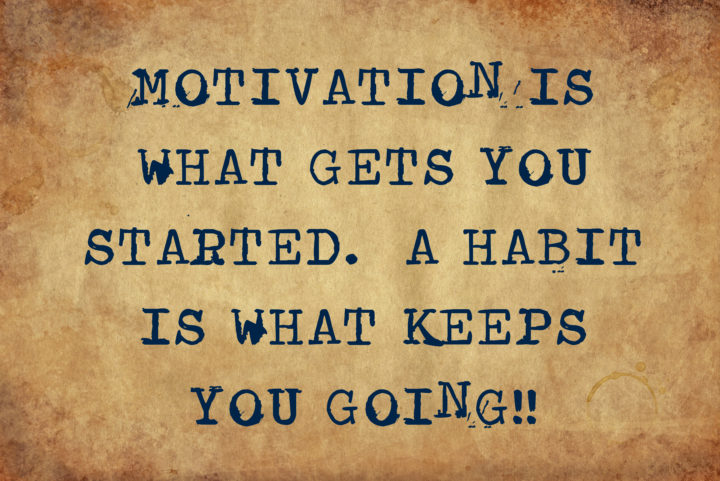My Resolution for 2020: LESS Motivation, Discipline and Willpower
Right now, at the start of a new decade, my motivation, discipline and willpower are at record near-highs, as I suspect yours probably are. How could they not be, at the start of a whole new decade? I’ve set myself ambitious goals for selling and writing, crafted plans to achieve them, disciplined my time, and resolved to use my willpower to do what it takes, even when I don’t feel like it.
Motivated, disciplined and resolute: if only these feelings would last, it will be a fantastic year!
But of course, they almost certainly won’t last, at least not at current levels. In fact, I’m actively working to ensure that they won’t. My principal goal for 2020 is to reduce the importance of motivation, discipline and willpower in my life.
Don’t get me wrong. I’m not opposed to being motivated, disciplined and strong-willed. They are hugely important qualities. But they are also uncertain, costly and risky. They’re uncertain because as we all know, high points are often followed by low points, and things happen that discourage or distract us from our goals and worthy behaviors. They’re costly in the sense that we have to think about them and make a conscious effort to apply them during those low points, precisely when we’re least equipped to deploy those mental and psychological resources. They’re risky because when we inevitably fall short of our own high expectations we tend to think there’s something wrong with us.
So, what’s the alternative? Wouldn’t it be great to have a silent partner who could increase the certainty and reduce the cost by shouldering the load during those times, and quietly and efficiently do the job for us when we don’t feel like it? Believe it or not, there actually is. We all have such a silent partner and it does much more for us than we’re probably aware of. It’s called habit, and according to Wendy Wood in her book, Good Habits, Bad Habits, it already works in approximately 43% of everything we do daily.
For example, were you motivated to brush your teeth this morning? Probably not, for the simple reason that you didn’t even have to think about it. You just did it automatically. If you had to think about it, that would have been one more small drain on your mental energy, and those things add up during the day.
Let’s take something more substantial: working out. Maybe you don’t work out regularly and you’ve made a resolution to do more of it this year. Assuming you haven’t procrastinated, a full week into the new year, you probably don’t have the same enthusiasm that you had on the first (or second) day of the new year, and it takes a big effort to get it done. I, on the other hand, have worked out every day this year, but that’s no great accomplishment because I worked out every single day for over four years. Working out daily has become so automatic with me that it would take a huge effort to break my streak. What some people find difficult is effortless to me.
But lest that sounds like bragging, let me also confess how difficult it has been for me to actually “motivate” myself to sit and actually write down these thoughts in my head. I seriously had to motivate myself to do it, and it’s taking a lot out of me. I have the best intentions to become much more regular in my writing for 2020, but my honest prediction is that my odds of success are less than fifty-fifty.
Habit runs so much of our lives, for better or worse, that it behooves us to make use of it. The good news is that with some intelligent application of motivation discipline and willpower in the short term, we can reduce the need for them in the long term. Instilling a beneficial habit is like buying a car for cash rather than leasing it. It may cost a lot up front, but then you have it for as long as it lasts without payments. (And unlike a car, it appreciates in value over time.)
“Intelligent application” is the key. Establishing a good habit or breaking a bad habit is possible if you try hard enough, but it’s so much easier if you understand the underlying dynamics of habit formation and use them to apply an effective process for doing so.
I know the process works because I waited a whole year before writing this article. A little over a year ago, I read James Clear’s Atomic Habits and resolved to work on some habits for 2019. One was daily journaling, and I actually managed to do so every single day of the year except one. Another was daily meditation, which I’ve tried and failed to pick up for years, until I finally made it a regular habit this year[1].
I will write more about the processes for habit formation in upcoming articles, as I apply them to two activities this year: prospecting and writing. I know they’re hugely important; I’m motivated to do both—and I always manage find innovative excuses to avoid them. I trust my learnings will be helpful, but if you don’t want to wait, I strongly suggest that you buy and study the two books I’ve mentioned in this article, and start crafting your own processes to instill productive habits.
Motivation, discipline and willpower: these are my flashy but fickle friends. I do plan to rely on them this year, but mostly to help me rely on my more faithful friend, habit!
[1] I highly recommend both books I’ve mentioned so far. Atomic Habits is engaging and hands-on, and the Good Habits, Bad Habits carries the scientific weight of one of the most accomplished researchers in the field.





